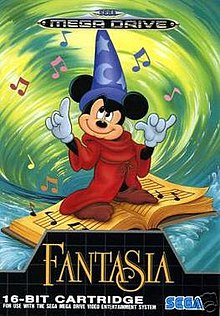
Teenage Mutant Ninja Turtles: The Hyperstone Heist, released in Europe as Teenage Mutant Hero Turtles: The Hyperstone Heist and in Japan as Teenage Mutant Ninja Turtles: Return of the Shredder, is a 1992 side-scrolling beat 'em up game developed and published by Konami for the Sega Genesis, based on the Teenage Mutant Ninja Turtles comic book characters. It was Konami's debut title for the Genesis. The game was re-released as part of Teenage Mutant Ninja Turtles: The Cowabunga Collection in 2022.

Bonanza Bros. is a 3D-style, 2D side-scrolling stealth action game developed and released by Sega in 1990. It is one of the earliest arcade games powered by the Sega System 24 arcade system board. It was ported to various home systems, including the Mega Drive/Genesis, Master System, PC-Engine/TurboGrafx-CD, and several home computers.

Castle of Illusion Starring Mickey Mouse is a 1990 platform game developed and published by Sega and released for the Mega Drive/Genesis. An 8-bit version of the game was later released for the Master System and Game Gear. The game follows Mickey Mouse on a quest to save Minnie Mouse from the evil witch Mizrabel. It is the first game in Sega's Illusion video game series starring Mickey.
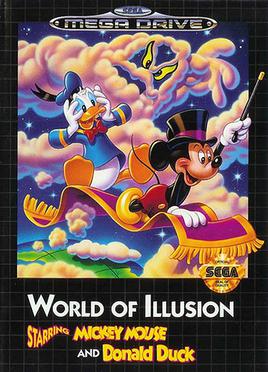
World of Illusion Starring Mickey Mouse and Donald Duck is a platform game developed and published by Sega for the Sega Genesis. The game was released in December 1992, and is part of Sega's Illusion series of Mickey Mouse games. The game was included on the Sega Genesis Mini.
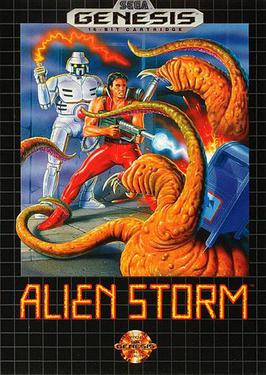
Alien Storm (エイリアンストーム) is a beat 'em up shooter released as an arcade video game by Sega in 1990. It was ported to the Genesis/Mega Drive and Master System. The Mega Drive version was re-released on Wii's Virtual Console in 2007 and was also included on Sonic's Ultimate Genesis Collection for Xbox 360 and PlayStation 3. The game was also re-released on the Nintendo Switch Online + Expansion Pack in 2022.

Disney's The Jungle Book is a series of platform video games based on the 1967 Disney animated film of the same name. The game was released by Virgin Interactive Entertainment in 1994 for the Game Boy, Nintendo Entertainment System, Master System, Genesis/Mega Drive, Game Gear, Super Nintendo Entertainment System, and MS-DOS. While gameplay is the same on all versions, technological differences between the systems forced changes – in some case drastic – in level design, resulting in six fairly different versions of the 'same' game. This article is largely based upon the Genesis version.
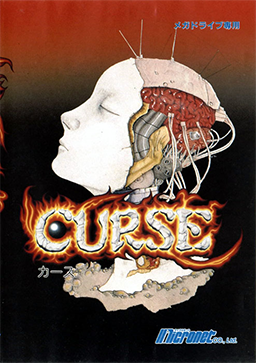
Curse is a 1989 video game developed by Micronet for the Mega Drive video game console. It is a horizontally scrolling shooter with five levels. Although an American release was planned, it was never officially released outside Japan.

Golden Axe II is a side-scrolling beat 'em up video game developed and published by Sega, first released on the Sega Mega Drive in December 1991. It is the home console sequel to the popular game Golden Axe, marking the second game in the series, though the arcade did see a sequel of its own in 1992, titled Golden Axe: The Revenge of Death Adder. Golden Axe II was only released on the Mega Drive, while the original was released on many other platforms. The game later appeared in Sonic's Ultimate Genesis Collection for Xbox 360 and PlayStation 3, as an iOS app on iTunes, and on the Nintendo Switch Online + Expansion Pack.
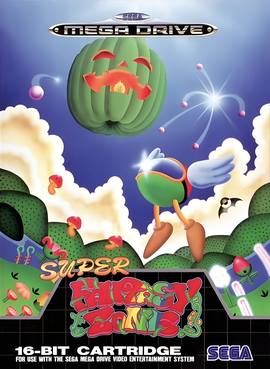
Super Fantasy Zone is a scrolling shooter, part of the Fantasy Zone series. It was released for the Sega Mega Drive in Japan and Europe. Players control the character Opa-Opa on his quest to defeat Dark Menon, and the game plays similarly to previous Fantasy Zone entries. The game plays similarly to Defender, where the screen scrolls in the direction that Opa-Opa is going. The player shoots at enemies to defeat them, collecting gold coins that are used to purchase temporary upgrades that improve Opa-Opa's offensive capabilities and speed, among other things.
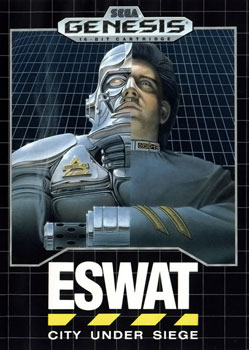
ESWAT: City Under Siege, released in Japan as Cyber Police ESWAT, is a 1990 side scrolling action platform video game developed and published by Sega for the Sega Genesis and Sega Master System video game consoles.

Disney's Ariel the Little Mermaid, usually shorted to simply Ariel the Little Mermaid, is a 1992 video game developed by BlueSky Software for the Sega Genesis, Game Gear and Master System, based on the 1989 film The Little Mermaid.

Crack Down (クラックダウン) is a run and gun arcade game released by Sega in 1989 and ported to the Sega Mega Drive/Genesis in 1990 in Japan and 1991 in North America by Sage's Creation. It was also ported and released to a number of home computer platforms by U.S. Gold.

Elemental Master is a top down scrolling shooter developed by TechnoSoft for the Sega Genesis and released in 1990 in Japan and in 1993 in North America by Renovation Products.
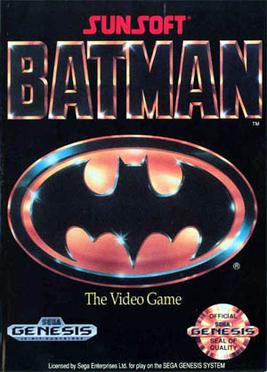
Batman is a video game developed by Sunsoft and released for the Sega Mega Drive in 1990. It was inspired by the 1989 Tim Burton-directed Batman film. The game is more faithful to the film's plot than the NES game of the same name and includes levels in which the player controls Batman's vehicles.

Illusion, known in Japan as I Love Mickey Mouse, is a series of platforming video games developed and published by Sega for its consoles Master System, Sega Genesis and Game Gear. The series follows the adventures of Disney's cartoon character Mickey Mouse between various fantasy worlds. The series includes Castle of Illusion, and its sequels Land of Illusion, World of Illusion and Legend of Illusion.
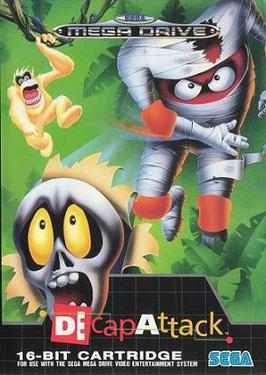
Decap Attack is a 1991 platform game developed by Vic Tokai and published by Sega for the Genesis. The game is a westernized version of the 1990 Japanese Mega Drive game Magical Hat no Buttobi Tābo! Daibōken, with the art, plot, music, and level designs all being changed. Both are updates of the late 1980s games Kid Kool and Psycho Fox. The game has also been released as part of several emulated compilations.
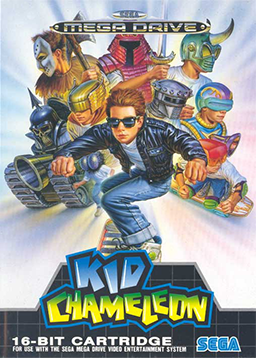
Kid Chameleon is a 1992 platform game developed and published by Sega released for the Sega Genesis. In the game, a boss character with artificial intelligence in a virtual reality video game begins abducting players and the main protagonist Casey goes in to beat the game and rescue them. He does this by using masks to shapeshift into different characters in order to use different abilities. It was later released in Japan. After its initial release in 1992 for the Genesis, it was later re-released a number of times in the 2000s, including part of the Sega Smash Pack 2 for the PC in 2000, the Sega Genesis Collection for the PlayStation Portable and PlayStation 2 in 2006, as a digital release on the Wii's Virtual Console in 2007, Sonic's Ultimate Genesis Collection for Xbox 360 and PlayStation 3 in 2009 and for the Sega Forever service in 2017.

Ghostbusters is a 1990 platform shoot 'em up video game developed and published by Sega for the Sega Genesis/Mega Drive. It features an original story based on the Ghostbusters films, and is unrelated to a 1984 Ghostbusters game by Activision. The game was released in the United States in August 1990, and was released in the United Kingdom later that year. A Brazilian version by Tec Toy was released for the console in 1991.

Terminator 2: Judgment Day is a 1993 action game developed by Bits Studios for two 16-bit game consoles: the Sega Genesis and the Super Nintendo Entertainment System (SNES). It was published by Acclaim Entertainment through subsidiary companies: Flying Edge for the Genesis, and LJN for the SNES. It is based on the 1991 film of the same name, and features side-scrolling and driving levels. It received generally negative reviews.

Undeadline is a 1989 vertically scrolling shooter video game developed and originally published by T&E Soft for the MSX2 and MSX2+ home computers. It was later ported to the X68000 computer and Sega Mega Drive, published by Palsoft, followed by digital re-releases for Microsoft Windows. Both the MSX2 and X68000 versions also received physical re-releases by Japanese retailer BEEP. It follows a group of characters in rescue of queen Althea from Zidane, a kingdom surrounded by barriers connected with the demon world, whose monsters have overflowed it. Controlling either a fighter, wizard, or ninja, the player can choose from six stages and play them in any order, fighting against waves of enemies and bosses, while defending or avoiding collision with their projectiles and other obstacles.
